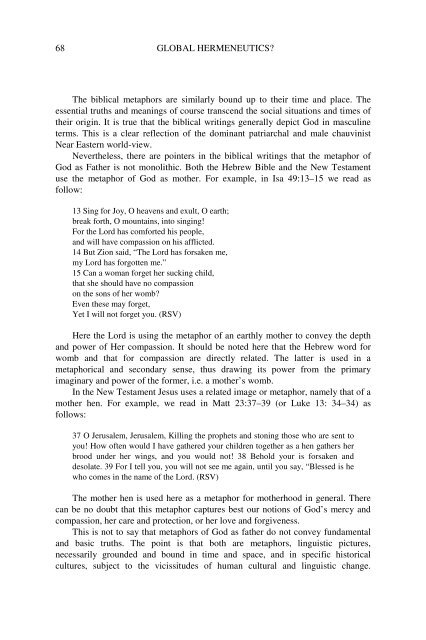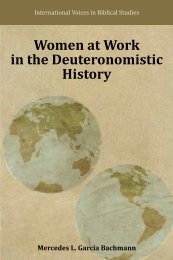Global Hermeneutics? - International Voices in Biblical Studies ...
Global Hermeneutics? - International Voices in Biblical Studies ...
Global Hermeneutics? - International Voices in Biblical Studies ...
You also want an ePaper? Increase the reach of your titles
YUMPU automatically turns print PDFs into web optimized ePapers that Google loves.
68 GLOBAL HERMENEUTICS?<br />
The biblical metaphors are similarly bound up to their time and place. The<br />
essential truths and mean<strong>in</strong>gs of course transcend the social situations and times of<br />
their orig<strong>in</strong>. It is true that the biblical writ<strong>in</strong>gs generally depict God <strong>in</strong> mascul<strong>in</strong>e<br />
terms. This is a clear reflection of the dom<strong>in</strong>ant patriarchal and male chauv<strong>in</strong>ist<br />
Near Eastern world-view.<br />
Nevertheless, there are po<strong>in</strong>ters <strong>in</strong> the biblical writ<strong>in</strong>gs that the metaphor of<br />
God as Father is not monolithic. Both the Hebrew Bible and the New Testament<br />
use the metaphor of God as mother. For example, <strong>in</strong> Isa 49:13–15 we read as<br />
follow:<br />
13 S<strong>in</strong>g for Joy, O heavens and exult, O earth;<br />
break forth, O mounta<strong>in</strong>s, <strong>in</strong>to s<strong>in</strong>g<strong>in</strong>g!<br />
For the Lord has comforted his people,<br />
and will have compassion on his afflicted.<br />
14 But Zion said, “The Lord has forsaken me,<br />
my Lord has forgotten me.”<br />
15 Can a woman forget her suck<strong>in</strong>g child,<br />
that she should have no compassion<br />
on the sons of her womb?<br />
Even these may forget,<br />
Yet I will not forget you. (RSV)<br />
Here the Lord is us<strong>in</strong>g the metaphor of an earthly mother to convey the depth<br />
and power of Her compassion. It should be noted here that the Hebrew word for<br />
womb and that for compassion are directly related. The latter is used <strong>in</strong> a<br />
metaphorical and secondary sense, thus draw<strong>in</strong>g its power from the primary<br />
imag<strong>in</strong>ary and power of the former, i.e. a mother’s womb.<br />
In the New Testament Jesus uses a related image or metaphor, namely that of a<br />
mother hen. For example, we read <strong>in</strong> Matt 23:37–39 (or Luke 13: 34–34) as<br />
follows:<br />
37 O Jerusalem, Jerusalem, Kill<strong>in</strong>g the prophets and ston<strong>in</strong>g those who are sent to<br />
you! How often would I have gathered your children together as a hen gathers her<br />
brood under her w<strong>in</strong>gs, and you would not! 38 Behold your is forsaken and<br />
desolate. 39 For I tell you, you will not see me aga<strong>in</strong>, until you say, “Blessed is he<br />
who comes <strong>in</strong> the name of the Lord. (RSV)<br />
The mother hen is used here as a metaphor for motherhood <strong>in</strong> general. There<br />
can be no doubt that this metaphor captures best our notions of God’s mercy and<br />
compassion, her care and protection, or her love and forgiveness.<br />
This is not to say that metaphors of God as father do not convey fundamental<br />
and basic truths. The po<strong>in</strong>t is that both are metaphors, l<strong>in</strong>guistic pictures,<br />
necessarily grounded and bound <strong>in</strong> time and space, and <strong>in</strong> specific historical<br />
cultures, subject to the vicissitudes of human cultural and l<strong>in</strong>guistic change.




